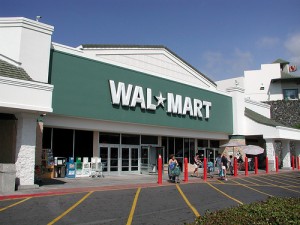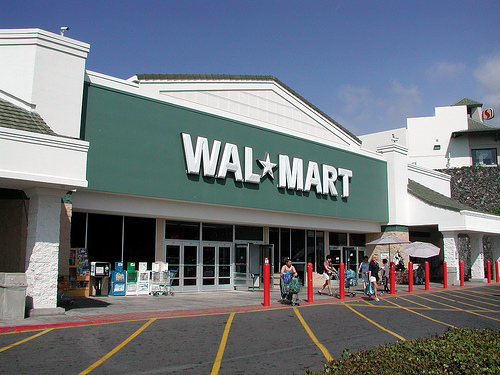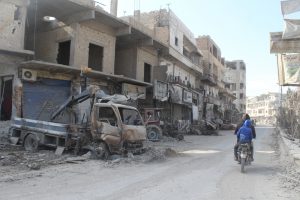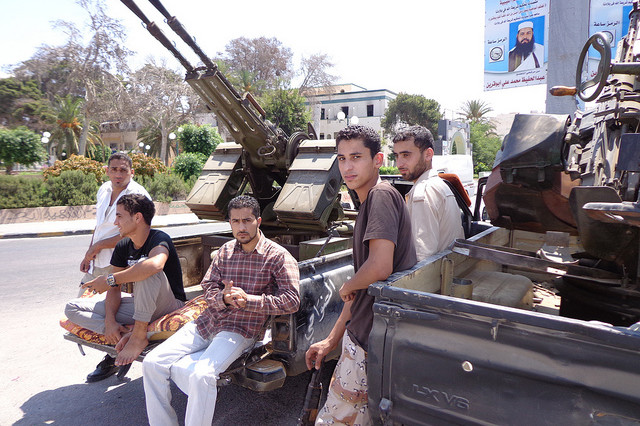 Last Sunday former President Bill Clinton asked the CEO of Walmart if he would open a store in Libya.
Last Sunday former President Bill Clinton asked the CEO of Walmart if he would open a store in Libya.
Surely Libya needs more jobs and needs to get its economy going, but I am not sure how a Walmart would do that. A large proportion of the goods that Walmart sells in the United States are imported into the United States, not made there. Seventy-five percent of the foodstuffs in Libya are imported from elsewhere. Libya has no real manufacturing base. Libya’s supply chains are hardly up to the task for feeding into a group of Walmarts. Most of the managers and even greeters may have to be foreigners initially. The people setting up the supply chains would also likely be non-Libyans given the complexity of what needs to be done and the lack of applicable training for most Libyans.
The finance for the setting up of the Walmart(s) would have to be via foreign direct investments likely from the United States. Those investments would need some insurance from the Overseas Private Investment Corporation. There would also need to be lots of cooperation and aid from the US government and the Libyan government regarding security for the initial buildings and the entire supply chain within Libya. Maybe the World Bank, the International Finance Corporation and others could be involved in developing the basic infrastructure and connections needed. Effort would also be required for improving the capacity of the Libyan government to handle economic development and the development of businesses.
Physical as well as financial security would be keys to the success of a Walmart in Libya. It would not take much for some trucks or even a store to have problems. Walmart is definitely an American brand and there are lots of Salafis and others who would want to do damage to anything representing an American brand. Consider what happened to the French Carrefour markets in Tunisia during its revolution. Think of what happened to outlets of major American food chains like KFC during the recent riots against that repulsive anti-Islam film. Think of the increasing anti-Americanism amongst some groups in the region and you can see that there could be some physical security issues.
Financial security may require that the payrolls, insurances, cash flows for inventory, maintenance, upkeep and more be kept offshore in part for a while. As the security and banking capacity situations in Libya change this could change. There could also be some significant foreign exchange risk involved, especially if the new Libya becomes more unstable and cannot get its economic act together. However, a good risk management team could hedge this if they knew the country well.
There are also some inherent financial and physical risks by simply being in North Africa and near Egypt and Tunisia, two countries that are still in the midst of trying to find their ways. Their revolutions are likely far from over. There is also a problem with Al Qaeda in the Maghreb and other AQ-like groups floating around the region. The instabilities to the south of Libya are hardly comforting.
Even so, my sense is that President Clinton’s heart was in the right place even if his logic needed a bit more work.
Libya needs foreign investment. There is a lot that American companies can do in Libya.
There are many people in Libya who are pro-American given that we helped their country gain some independence from the wretched regime of Qhaddafi. Many of the expatriate leadership of Libya of the older generations spent some time in the United States. We could gain a lot by helping some of the younger people, appropriately vetted, to get scholarships to visit and study in the United States. Sometimes the best way to make friends and future allies is to give them a good experience in the United States and provide high-quality education and training. There are great opportunities even within the massive and volatile risks of Libya.
That said there are many people in Libya including some militias, extremist groups, pro-Ghaddafi remnants and more who do not like the United States, to put it mildly.
It will be vital to understand the overall environment on the ground of who is who and where they stand before moving forward. It may be a big mistake to write off Libya because of the vicious and evil behavior of a few when the majority of the country could benefit. But we need to be sure.
However, dropping Libya as a place to help may end up delivering it to the extremists and that is a very bad idea.
There is another side to the Walmart story. What about all of the small mom and pop stores, green grocers, kiosks and others in Libya who may be put out of business due to the Walmart. Many of these have been put out of business here. How would Libyans react to being put out of business by a massive American company?
On the other hand, if Walmart and other US companies take the leap into the new North Africa they could help develop countries and their people while at the same time making serious profit. However, the Walmart model may not be the best one to start out with.
Indeed, there are risks. Normally in such situations the only companies that come in are the oil and gas companies or other major energy companies that have vast experience working in conflict and post-conflict zones.
Maybe President Clinton was trying to get a discussion and debate going in US business communities as well as in the government about how the US could help the economies of these hurting countries in a (hopefully) post-conflict environment. This is an important thing to consider even if the situation looks dismal from afar.
Developing the economies of these countries will be far from easy and there are likely to be many bumps along the road – some of them very steep and risky. However, with the right incentives and the right risk management, it may be possible to make a difference and to do well by doing good.
Perhaps there could be some tax breaks and free land to build on in return for training and educating Libyans and increasing the percentage of Libyans working at the Walmart or other such stores. There will need to be some give and take. I know that the tax breaks and free land (for a limited time of perhaps 10 to 20 years and then the lease fees kick in) are contentious. But Libya needs to move forward and get its people — especially its young people — employed. Maybe the United States could improve its reputation in the region by doing just that.
You make more friends by creating jobs than dropping bombs. Developing a better security situation in a region via real strategic thinking can involve a lot more than just the military and the State Department. Sometimes businesses can make a big difference.
However, many businesses need to be sure that they are not going to walk into mine fields before they move forward with serious investments.
There is a certain menace attached to Libya now. Violent extremists created that. Should we give up on the rest of the Libya because of the people who want to destroy it rather than build it up?






Great article. I don’t know about Libya per se, but the US still is seen in a better light in the Magreb, than in Egypt or the Middle East, where our policies and interventions have a direct effect. In the Magreb, we’re still remembered for fighting Rommel, when we liberated these countries and moved on.
On that note is my only quibble. I think a Wal-mart, or better still an Aldi or Trader Joe’s would likely draw intense interest and curiosity. I don’t know how well these’d fare. There are some larger grocery stores that remind me of our American grocery stores from the 70’s. But, their prices are high, their quality isn’t as good on meat and produce, and I’m not sure they fit their venerable distribution channels. We could argue that we’re reverting to their system, or idealize a system more akin to theirs–local, more organic, more sustainable.
Those suppliers, and their seasonal offering are problematic for large corporate producers. McDonald’s want’s to be sure their beef, potatoes, and even the few tomatoes they sell is consistent, and always available. That would be harder in climates where potatoes are imported.
It’s a fascinating subject, and I think could be better handled through subsidiaries, and cooperative partnerships. They have much to teach us, particularly about their likes, and the expectations of their customers. And, we certainly have much to teach them–try finding crispy pomme frites in Algeria. They tend to pack the friers, resulting in soggy fries. Hamburgers are huge there, and buns have even turned up, so they are getting there, with or without us.